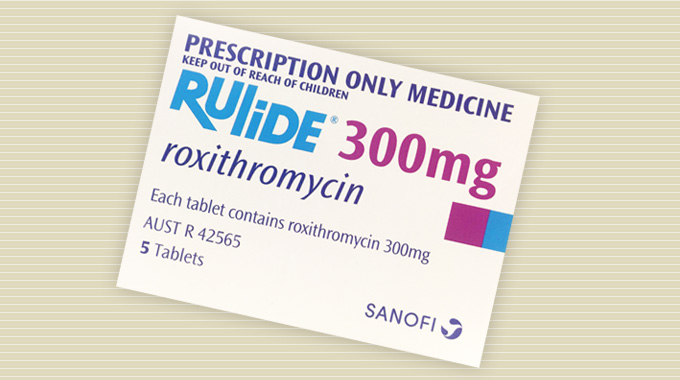Rulide (roxithromycin)
Rulide or roxithromycin is amacrolide antibiotic. It is semi-synthetic in nature and is used for treating urinary, soft tissue, and respiratory tract infections. This medication id derived from erythromycin. They are found under many brand names. They are commonly found in the form of tablets and oral suspensions. This drug helps in preventing the growth of bacteria by causing interference with the way they synthesize their proteins. Roxithromycin is more operational against certain types of gram-negative bacteria, especially Legionella pneumophila.

Dosage
The dosage of Rulide (roxithromycin) can vary depending on the specific condition being treated, the severity of the infection, and the guidance of your healthcare provider. It is important to follow the instructions provided by your doctor or the directions on the prescription label.For most common bacterial infections, the typical adult dosage of Rulide is 150 mg taken orally twice daily, or 300 mg taken orally once daily. However, the dosage may be adjusted based on the specific infection and the individual's response to treatment.
For pediatric patients, the dosage is usually determined based on their weight. The pediatric dosage of Rulide is typically prescribed as a once-daily dose, with the specific amount determined by the child's weight.
The duration of treatment with Rulide will depend on the type and severity of the infection. It is important to complete the full course of treatment as prescribed by your healthcare professional, even if your symptoms improve before the medication is finished. Skipping doses or stopping the medication prematurely can lead to incomplete treatment and a higher risk of the infection recurring.
Composition
Rulide is a semi-synthetic antibiotic drug. The tablets are found in two strengths (150 mg and 300 mg). They are round film-coated tablets that are white in colour. The active ingredient in rulide is roxithromycin. It also contains lows substituted hydroxypropyl cellulose (hyprolose).
Uses
There are various bacterial infections affecting different parts of the body which can be treated with the help of this medication. Some of these medical conditions are mentioned below:
- Sinusitis
- Acute bronchitis (infection in the bronchi that causes coughing)
- Tonsillitis
- Acute pharyngitis (discomfort while swallowing and sore throat)
- Pneumonia (lung infection characterized by malaise, fever, headache)
- Soft tissue and skin infections
- Impetigo (bacterial infections that cause sores on the skin)
- Non-gonoccocal urethritis
Rulide belongs to a group of drugs known as macrolides. They prevent the growth of the bacteria that causes the infection in the body. Rulide only works in treating bacterial infections. They do not cure viral infections (like flu and common cold). These have been no evidence saying that the roxithromycin tablets are addictive.
Side effects
There are many side-effects associated with the use of rulide that might require medical attention. Some may not require any. With time when the body gets used to the medication, the side-effects may eventually disappear. Some of these side-effects are:
- Vomiting and nausea
- Diarrhoea
- Tinnitus or ringing sensation in the ear
- Sleep disturbance
- Irregular heartbeat, palpitations
- Jaundice (skin and eyes turning yellow)
- Decrease in the ability to hear
- Severe and bloody diarrhoea
- Allergic reaction like blistering, rashers, peeling of the skin, hives, swollen lips, difficulty in breathing etc.
- Abdominal pain
- Dizziness
- Headache
- Vertigo
- Changes in the senses of taste and smell
- Abnormal liver function

Contraindications
There are certain conditions when rulide should not be prescribed to the patient. They are mentioned below:
- Hypersensitivity towards macrolides, that include erythromycin
- Severe impairment in the hepatic function
- Concomitant therapy along with vasoconstrictive ergot alkaloids
Rulide and pregnancy
Animal studies have shown evidences of developmental abnormalities. When doses higher than 180 mg/kg/day were assigned to rats, there were maternotoxicity and embryotoxicity. The risks associated with the use of rulide for human fetus is not yet established. Therefore, the doctor must be very careful when the patient is pregnant or plans on being pregnant.
Some frequently asked questions about Roxithromycin
What is Roxithromycin?
Roxithromycin is an antibiotic medication that belongs to the macrolide class. It is used to treat various bacterial infections, including respiratory tract infections, skin and soft tissue infections, and certain types of sexually transmitted infections.
How does Roxithromycin work?
Roxithromycin works by inhibiting the growth and spread of bacteria in the body. It does this by binding to the bacterial ribosomes and interfering with the protein synthesis process, ultimately leading to the death of the bacteria.
What conditions can Roxithromycin treat?
Roxithromycin is commonly prescribed for respiratory tract infections such as bronchitis and pneumonia. It is also effective in treating skin and soft tissue infections, including cellulitis and impetigo, as well as certain sexually transmitted infections like chlamydia.
How is Roxithromycin administered?
Roxithromycin is usually taken orally in the form of tablets or suspension. The dosage and duration of treatment will depend on the type and severity of the infection, as well as the individual's age and overall health. It is important to follow the instructions provided by your healthcare provider.
Are there any side effects associated with Roxithromycin?
Like any medication, Roxithromycin can cause side effects. Common side effects may include nausea, vomiting, diarrhea, abdominal pain, headache, and allergic reactions. If you experience severe or persistent side effects, it is important to seek medical attention.
Can Roxithromycin interact with other medications?
Roxithromycin may interact with certain medications, including antacids containing aluminum or magnesium, anticoagulants, and certain antifungal drugs. It is important to inform your healthcare provider about all the medications you are currently taking to avoid potential interactions.
Can Roxithromycin be used during pregnancy or while breastfeeding?
It is important to consult with your healthcare provider before using Roxithromycin during pregnancy or while breastfeeding. They can evaluate the potential risks and benefits and provide guidance based on your specific situation.
What should I do if I miss a dose of Roxithromycin?
If you miss a dose, take it as soon as you remember, unless it is close to the time for your next scheduled dose. In that case, skip the missed dose and continue with your regular dosing schedule. Do not double the dose to make up for the missed one.
- Download in PDF » Rulide: Product Information


